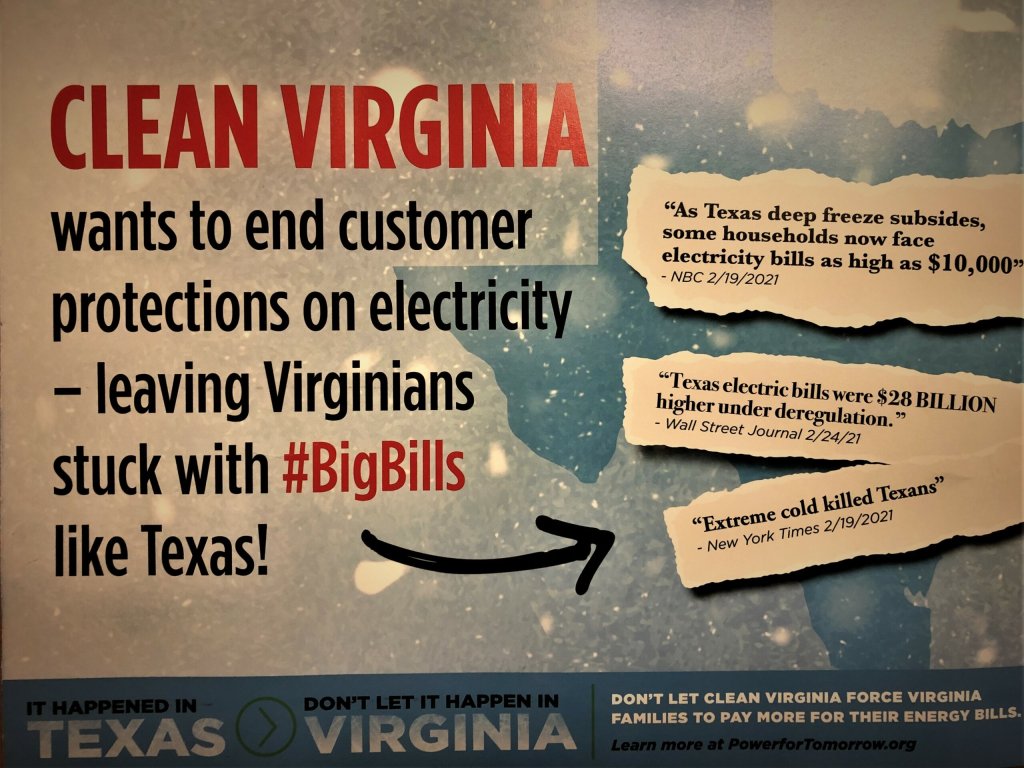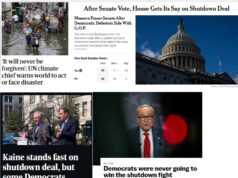 By Ivy Main, cross-posted from Power for the People VA
By Ivy Main, cross-posted from Power for the People VA
It’s campaign season in Virginia, with primary elections coming up on June 8. But in addition to all the candidate flyers arriving in mailboxes, Virginia residents have been receiving another kind of mailer with a message unrelated to the election.
Oversized, campaign-style postcards from an entity calling itself Power for Tomorrow warn, “Clean Virginia wants to end customer protections on electricity — leaving Virginians stuck with #BigBills like Texas!” Quotes from headlines about last winter’s disastrous power outage in Texas sprinkle the page to drive home the message that “It happened in Texas. Don’t let it happen in Virginia.”
The flip side of the postcard reads, “We can’t allow so-called ‘Clean Virginia’ to spend millions to influence Richmond politicians and make hardworking Virginians pay more for electricity.” The cards then urge people to join a texting campaign targeting legislators.
What’s going on here? According to the nonprofit Energy and Policy Institute, Power for Tomorrow is a utility front group that is “Virginia-based and Dominion Energy-connected.” Power for Tomorrow “opposes efforts to introduce greater competition to monopoly utilities and provides a platform for former regulators to advocate for utility interests.” Its directors and experts are mostly lawyers and lobbyists who represent utility interests. Its website claims the Texas power outage “catalyzed the launch” of the group, but Energy and Policy Institute notes that the website first launched in 2019, and only re-launched this year following the Texas debacle.
In addition to the postcard mailer, Power for Tomorrow has also run television and Facebook ads. According to Virginia Public Media, as of May 14 the organization had spent at least $220,000 on TV ads and at least another $90,000 on Facebook ads. Dominion Energy spokesperson Rayhan Daudani told Virginia Public Media that Dominion is “proud to support Power for Tomorrow and its efforts to educate people about the dangers of electric deregulation.” He also asserted Dominion’s political contributions, including those to Power for Tomorrow, were “bipartisan and transparent.”
The bipartisan part is true; Virginia Public Access Project records show Dominion gives money to both Democrats and Republicans. Doing so ensures the company has influence no matter which party holds power. Dominion’s political donations to Virginia elected leaders add up to over $3 million in just the last year and a half (making its criticism of Clean Virginia’s spending more than a little hypocritical). “Transparent” is another matter, however; neither VPAP nor any other source I could find reveals how much money Dominion has provided to Power for Tomorrow.
As for the claims about customer protections, the mailer’s message stands Clean Virginia’s purpose on its head. Clean Virginia advocates for decreasing the influence of utilities on the General Assembly and increasing regulatory oversight by the State Corporation Commission. The legislation it supported in 2021 uniformly would have returned more money to customers. The reason Clean Virginia “spends millions to influence Richmond politicians” is to counter Dominion Energy’s spending and political influence in Richmond. There would be no need for Clean Virginia if the General Assembly weren’t already under the utility’s thumb.
According to Clean Virginia’s website, the five energy reform bills the group supported in 2021 were:
- HB2200, restoring SCC discretion over Dominion rate-setting and accounting practices
- HB1984, allowing the SCC to set future rates to reflect the true cost of service
- HB1914, giving the SCC the ability to set the time period for utilities to recover large one-time expenses, eliminating an accounting gimmick that benefited utilities at the expense of customers
- HB2160, requiring utilities to return 100% of overcharges to customers, instead of being allowed to keep 30 percent
- HB2049, also aimed at supporting rate reductions or refunds
All of these bills passed the House with bipartisan support but failed in the Senate, where the Commerce and Labor committee remains Dominion-friendly.
The Power for Tomorrow ads don’t try to defend Dominion’s opposition to customer-friendly legislation. Instead, they reference a broader effort by Clean Virginia and an unusual alliance of several progressive and conservative free-market groups to restructure Virginia’s utilities. Calling themselves the Virginia Energy Reform Coalition, the allies supported legislation in 2020 that would have separated the generation and transmission functions of Dominion and Appalachian Power and introduced competition in the sale of electricity.
Whether the long-term effects of this kind of energy deregulation would be good or bad for Virginia residents is a matter of furious debate, but clearly the legislation would have hurt Dominion’s profits. In any event, the bill never even got a vote last year, and was not brought back in 2021.
The Power for Tomorrow campaign deliberately muddies the water. While mentioning only the stillborn deregulation effort, its attacks on Clean Virginia are meant to undercut support for other legislation that increases utility regulation.
So what about the threat of Texas-style power outages? Where is the connection? Power for Tomorrow would like you to believe that competition leads to disaster. But the mailer is vague about how what happened in Texas might happen here, and for good reason: It won’t.
What happened in Texas was due to generating facilities (mostly natural gas) freezing up and failing to deliver electricity to the state’s isolated power grid. With too much demand and not enough supply, short-term power costs soared, and people who’d opted for electricity plans that tracked real-time prices received astronomical bills. Simple regulatory fixes could have avoided both the blackouts and the sky-high bills, but Texas politicians and grid operators shied away from imposing those requirements. Failure to regulate, not deregulation, was to blame.
When the lights go out in Virginia, by contrast, downed power lines and blown transformers are typically to blame. In other words, the problem is in the delivery, not the generation. Our electricity supply is more secure than Texas’ because Virginia is part of the larger PJM transmission grid that covers all or parts of 13 states from the East to the Midwest. Not only does PJM have a huge excess of generating capacity, but generators have to guarantee they will deliver electricity when called on, and would be penalized by failure to winterize their facilities. Those guarantees are absent in Texas.
Introducing competition to the Virginia utility market would not change any of this. Some states within PJM have deregulated utilities, others have vertically-integrated utilities like Virginia’s. The Texas blackouts were scary; they are also a red herring. Apparently the cynics at Power for Tomorrow think there is nothing wrong with a non sequitur if it gets people’s attention.
But is it getting their attention? I checked with a couple of legislators, neither of whom had received any texts or emails from constituents generated by the advertising. Either the campaign isn’t working, or Power for Tomorrow is just building out a mailing list to deploy later, perhaps in the next legislative session when regulatory reform bills come up again.
At that point we may find out whether Dominion has built an anti-reform constituency with these misleading ads, or just added fuel to the fire.
This article originally ran in the Virginia Mercury on June 2, 2021. It has been updated to correct the day of the June primary. It is June 8, not June 6.













